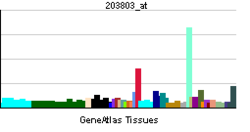- PCYOX1
-
Prenylcysteine oxidase 1 Identifiers Symbols PCYOX1; KIAA0908; PCL1 External IDs OMIM: 610995 MGI: 1914131 HomoloGene: 9458 GeneCards: PCYOX1 Gene EC number 1.8.3.5 Gene Ontology Molecular function • prenylcysteine oxidase activity
• chloride-transporting ATPase activity
• oxidoreductase activityCellular component • lysosome
• plasma membrane
• very-low-density lipoprotein particleBiological process • chloride transport
• prenylated protein catabolic process
• prenylated protein catabolic process
• prenylcysteine catabolic process
• prenylcysteine metabolic processSources: Amigo / QuickGO RNA expression pattern 
More reference expression data Orthologs Species Human Mouse Entrez 51449 66881 Ensembl ENSG00000116005 ENSMUSG00000029998 UniProt Q9UHG3 Q3TVT6 RefSeq (mRNA) NM_016297 NM_025823.4 RefSeq (protein) NP_057381 NP_080099.1 Location (UCSC) Chr 2:
70.48 – 70.51 MbChr 6:
86.34 – 86.35 MbPubMed search [1] [2] Prenylcysteine oxidase 1 is an enzyme that in humans is encoded by the PCYOX1 gene.[1][2][3]
References
- ^ Tschantz WR, Zhang L, Casey PJ (Jan 2000). "Cloning, expression, and cellular localization of a human prenylcysteine lyase". J Biol Chem 274 (50): 35802–8. doi:10.1074/jbc.274.50.35802. PMID 10585463.
- ^ Digits JA, Pyun HJ, Coates RM, Casey PJ (Oct 2002). "Stereospecificity and kinetic mechanism of human prenylcysteine lyase, an unusual thioether oxidase". J Biol Chem 277 (43): 41086–93. doi:10.1074/jbc.M208069200. PMID 12186880.
- ^ "Entrez Gene: PCYOX1 prenylcysteine oxidase 1". http://www.ncbi.nlm.nih.gov/sites/entrez?Db=gene&Cmd=ShowDetailView&TermToSearch=51449.
Further reading
- Maruyama K, Sugano S (1994). "Oligo-capping: a simple method to replace the cap structure of eukaryotic mRNAs with oligoribonucleotides.". Gene 138 (1–2): 171–4. doi:10.1016/0378-1119(94)90802-8. PMID 8125298.
- Zhang L, Tschantz WR, Casey PJ (1997). "Isolation and characterization of a prenylcysteine lyase from bovine brain". J. Biol. Chem. 272 (37): 23354–9. doi:10.1074/jbc.272.37.23354. PMID 9287348.
- Suzuki Y, Yoshitomo-Nakagawa K, Maruyama K et al. (1997). "Construction and characterization of a full length-enriched and a 5'-end-enriched cDNA library". Gene 200 (1–2): 149–56. doi:10.1016/S0378-1119(97)00411-3. PMID 9373149.
- Nagase T, Ishikawa K, Suyama M et al. (1999). "Prediction of the coding sequences of unidentified human genes. XII. The complete sequences of 100 new cDNA clones from brain which code for large proteins in vitro". DNA Res. 5 (6): 355–64. doi:10.1093/dnares/5.6.355. PMID 10048485.
- Strausberg RL, Feingold EA, Grouse LH et al. (2003). "Generation and initial analysis of more than 15,000 full-length human and mouse cDNA sequences". Proc. Natl. Acad. Sci. U.S.A. 99 (26): 16899–903. doi:10.1073/pnas.242603899. PMC 139241. PMID 12477932. http://www.pubmedcentral.nih.gov/articlerender.fcgi?tool=pmcentrez&artid=139241.
- Clark HF, Gurney AL, Abaya E et al. (2003). "The Secreted Protein Discovery Initiative (SPDI), a Large-Scale Effort to Identify Novel Human Secreted and Transmembrane Proteins: A Bioinformatics Assessment". Genome Res. 13 (10): 2265–70. doi:10.1101/gr.1293003. PMC 403697. PMID 12975309. http://www.pubmedcentral.nih.gov/articlerender.fcgi?tool=pmcentrez&artid=403697.
- Gerhard DS, Wagner L, Feingold EA et al. (2004). "The Status, Quality, and Expansion of the NIH Full-Length cDNA Project: The Mammalian Gene Collection (MGC)". Genome Res. 14 (10B): 2121–7. doi:10.1101/gr.2596504. PMC 528928. PMID 15489334. http://www.pubmedcentral.nih.gov/articlerender.fcgi?tool=pmcentrez&artid=528928.
- Liu T, Qian WJ, Gritsenko MA et al. (2006). "Human Plasma N-Glycoproteome Analysis by Immunoaffinity Subtraction, Hydrazide Chemistry, and Mass Spectrometry". J. Proteome Res. 4 (6): 2070–80. doi:10.1021/pr0502065. PMC 1850943. PMID 16335952. http://www.pubmedcentral.nih.gov/articlerender.fcgi?tool=pmcentrez&artid=1850943.
- Wouters MM, Neefs JM, Kerchove d'Exaerde A et al. (2006). "Downregulation of two novel genes in Sl/Sld and W(LacZ)/Wv mouse jejunum". Biochem. Biophys. Res. Commun. 346 (2): 491–500. doi:10.1016/j.bbrc.2006.05.132. PMID 16765319.
Categories:- Human proteins
- Chromosome 2 gene stubs
Wikimedia Foundation. 2010.
